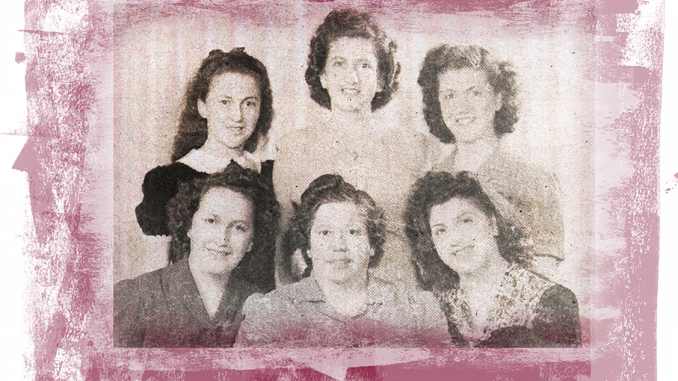

COURTNEY REDMON / THE TEMPLE NEWS
We found a VHS tape while visiting my grandmother last summer. My mother, brother, grandmother and I knew there was footage of a past family reunion on it, so we popped it into the video player.
It didn’t start with footage from the reunion.
Nona, my great-grandmother who immigrated to Massachusetts from Naples, Italy, in the early 1900s, sat at a kitchen table. One of her daughters, who is my Great-Aunt Bena, and Nona’s granddaughter Rebecca were asking about her life. In a thick accent, she told the story of coming to the United States with her sister and her mother as a young girl; sometimes she’d slip into Italian and a bit of the story would be lost to us.
It was the first time I heard the voices of four generations in one room.
Then the video cut to the reunion. We all fell into a specific role for watching: my brother laughed at the snarky jokes the cousins exchanged; my mom would comment on how young everyone looked and how little some had changed; I stared hungrily at every frame that contained my grandfather, who I had so few memories of outside the hospital visits when I was little; and my grandmother named everyone who appeared — a difficult feat for someone watching a fuzzy video of more than 50 people.
She’s the only one left who can do that.
As I grew up, my grandmother’s sisters were diagnosed with dementia, and one by one their memories begin slipping away. Her brother Tony and sister Lily died when I was young, so I remember very little of them.
I didn’t quite understand what dementia meant when my mother first tried to explain it to me when I was in elementary school. It seemed more like a catalyst for funny stories: Bena, always the precocious one, had even less of a filter than usual, and Jo, her sister, would sometimes go off on adventures that sent people into a panic, but almost always ended in laughter.
It was when they stopped recognizing me, I understood. Then they didn’t know who my mother was — but they always knew my grandmother.
Bena died several years ago, then Jo died last week. I was never as close with them as I am with my grandmother, Viola.
When my mom told me about Jo on Thursday, she said my grandmother called to say Jo was failing fast, and they should visit her in the coming day or two. A few minutes after hanging up, she said my grandmother called again to say Jo was gone.
“That’s so fast,” I said. “There was no chance to say goodbye.”
“She’s been saying goodbye to them for a long time,” my mom said.
She was right.
Jo’s body died on Wednesday, but the person left in it was only a couple of threads of memory.
I remember when she was vibrant. Jo, like my grandmother, had bright white hair and a warm smile.
She would take my face in both her hands and kiss my cheeks, then squeeze my face and shake my head a little, saying, “Oh now, look at you. You’re so big!”
It’s a generic memory, I know, but that’s what I have.
I also have the little gibes my grandmother’s sisters would direct at each other. Somehow, while slowly forgetting the rest of us and who they were, they never stopped being sisters.
I know it’s going to be a difficult week for my grandmother, because even though she still has her sister, Gloria, she’s not the same person since her diagnosis. I called her on Friday to ask about Jo, and it was hard hearing the tired sadness in her voice. The cracks weren’t because of her age, and I heard her take a breath before going on.
She said Jo was “full of the devil,” and that Nona had called her “little kangaroo” in Italian because she always bounced around the house.
“Say ‘dance’ and she’d be gone all night long,” my grandmother added.
But then she started telling me other stories about growing up with her sisters.
“They never called me Viola,” she said. “It was always Baby. ‘Baby do this. Baby, go get that.’ Because I was the youngest. When I was older, I became one of them.”
As she told me these stories, I knew the room was melting away for my grandmother. She was back in the dance halls with her sisters, or pranking the local police department (even though she maintains they always “walked the straight and narrow”).
At 20 years old, I can’t quite figure out what it’s like to escape back into my memories. But I know how much it must mean for my grandmother to do so, because they haven’t escaped her.



Be the first to comment